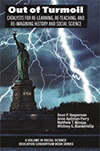
Out of Turmoil
Catalysts for Re-learning, Re-Teaching, and Re-imagining History and Social Science
Edited by:
Dean P. Vesperman, University of Wisconsin-River Falls
Anne Aydinian-Perry, University of Wyoming
Matthew T. Missias, Grand Valley State University
Whitney G. Blankenship, San Antonio College
A volume in the series: Social Science Education Consortium Book Series. Editor(s): Whitney G. Blankenship, San Antonio College. Matthew T. Missias, Grand Valley State University. Anne Aydinian-Perry, University of Wyoming. Dean P. Vesperman, University of Wisconsin-River Falls.
Published 2023
It is not difficult to argue that the social sciences are in a period of transition. Our day-to-day lives have been marked by uncertainty as our social lives have vacillated wildly between highs and lows, tensions between fellow citizens have heightened along ideological fault lines, and educators have been placed squarely at the center of public discourses about what—and how—we should be teaching. By any measure, we are living in a time where every moment seems to be rife with high stakes realities that must be navigated.
Ladson-Billings (2020) called on educators to reimagine education and contest the notion of a “return to normal.” In the current highly polarized context where we see multiple competing narratives, rather than promoting a “return to normal” or “business as usual” approach, we argue that educators must use the lessons of the last two years, as well as draw on what we have learned from history and the social sciences. By asking ourselves how we might interrogate and inform current social landscapes and the challenges that arise from them, we have the opportunity to take leadership in fostering innovation, building solidarity, and re-imagining the teaching and learning of history and the social sciences.
We recognize that humans live in multiple complex communities that include intersectional identities; relationships with power, agency, and discourses; and lived realities that are as unique as they are divergent. Consequently, the task of educators, and the goal of this volume, is to provide a clarion voice to a dynamic, relational, and undeniably human social world.
CONTENTS
Acknowledgments. Introduction, Dean P. Vesperman, Anne Aydinian-Perry, Matthew T. Missias, and Whitney G. Blankenship. PART I: CRITICAL EDUCATION IN TIMES OF TURMOIL. Approaching Critical Literacy With a Critical Race Theoretical Approach to Encourage Reflective and Just Democracy, Amy J. Samuels and Gregory L. Samuels. What Do We Need to Know Now? Racial and Technological Pedagogical Content Knowledge for Discussing Race in Online History Classrooms, Lightning Jay. Preparing White Students for a Multiracial World, Antony Farag and Bailey Verdone. PART II: PEDAGOGIES OF CHANGE. Teaching Social Studies in a Time of COVID-19: An Examination of Contradictions in Activity, Dean P. Vesperman and Mariah Pol. Re-imagining Citizenship Education Through Critical-Transformational Human Rights Education, Ian M. McGregor, Glenn Mitoma, and Sandra Sirota. The Three Cs for Teaching in Contentious Times, Debby Shulsky and Sheila Baker. Un-learning, Re-learning, and Re-imagining Together: Early Career Teachers Engaging in Collaboration Toward Racial Literacies Development, Mary Adu-Gyamfi, Joey Laurx, Trustin Dinsdale, and Rylie Kever. PART III: GLOBAL RESPONSES TO TURMOIL. A Tumultuous Tale of Socially Just Teaching: A Migrant Asian Australian Teacher’s Critical Autoethnographic Account of Guiding White Bodies Through an Asian Ethnoburb, Aaron Teo. Engaging With National Histories and Settler Colonial Master Narratives to Foster an Anti-Racist and Culturally Responsive Citizenry: The Pedagogy of Critical Ethical Nationalism in the Shadow of National Statues, Mary Frances O’Dowd. How is Racism a Global Issue? Connecting Critical Global Education to the Teaching of Race, Hanadi Shatara and Gerardo Aponte-Safe. PART IV: RECONCEPTUALIZING CURRICULUM. Centering Indigenous Voices: A Book and Film Study in a University Social Studies Content Course, Linda Doornbos. Journey Box Projects for a Post-Pandemic World: How the Experiences of Teacher Candidates Invite the (Re)imagination of Culturally Relevant Social Studies Education, Kaitlin E. Popielarz. African American History and Its Visual Portrayal in Textbooks, Tina L. Heafner and Antoinette M. L. Rochester. Re-imagining Heroes and Holidays: Possibilities for Folkloristics in History and Social Science Education, Mark E. Helmsing. Biographies.
-
Paperback979-8-88730-075-7
Web price: $45.04 (Reg. 52.99)
-
Hardcover979-8-88730-076-4
Web price: $80.74 (Reg. 94.99)
- eBook979-8-88730-077-1

- EDU029040 - EDUCATION: TEACHING METHODS & MATERIALS: Social Science
- EDU048000 - EDUCATION: Inclusive Education
- EDU040000 - EDUCATION: Philosophy & Social Aspects
-
 (Re)Envisioning Social Studies Education Research
Current Epistemological and Methodological Expansions, Deconstructions, and Creations
(Re)Envisioning Social Studies Education Research
Current Epistemological and Methodological Expansions, Deconstructions, and Creations
-
 Beyond Single Stories
Changing Narratives for a Changing World
Beyond Single Stories
Changing Narratives for a Changing World
-
 Democracy at a Crossroads
Reconceptualizing Socio-Political Issues in Schools and Society
Democracy at a Crossroads
Reconceptualizing Socio-Political Issues in Schools and Society
-
 Fostering Diversity and Inclusion in the Social Sciences
Fostering Diversity and Inclusion in the Social Sciences
-
 Personal Truths
Youth Utilizing Artmaking to Promote Diversity, Equity, Inclusion, and Belonging
Personal Truths
Youth Utilizing Artmaking to Promote Diversity, Equity, Inclusion, and Belonging
-
 Promoting Equitable Classroom Practices in Higher Education
Approaches Beyond Curriculum
Promoting Equitable Classroom Practices in Higher Education
Approaches Beyond Curriculum
-
 The Divide Within
Intersections of Realities, Facts, Theories, and Practices
The Divide Within
Intersections of Realities, Facts, Theories, and Practices

